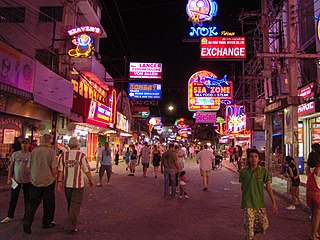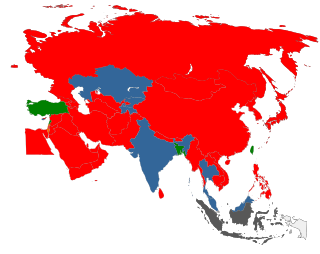Related Research Articles
Enjo kōsai, shortened to enkō (援交), is a type of transactional relationship similar to the Western sugar dating. It is the Japanese language term for the practice of older men giving money and/or luxury gifts to attractive young women for sexual favors. The female participants range from school girls to housewives. The term is often translated as "compensated dating" or "subsidized dating".
An escort agency is a company that provides escorts for clients, usually for sexual services. The agency typically arranges a meeting between one of its escorts and the client at the customer's house or hotel room (outcall), or at the escort's residence (incall). Some agencies also provide escorts for longer durations, who may stay with the client or travel along on a holiday or business trip. While the escort agency is paid a fee for this booking and dispatch service, the customer must negotiate any additional fees or arrangements directly with the escort for any other services that are not provided by the agency involved, such as providing sexual services.

Prostitution in Thailand is not itself illegal, but public solicitation for prostitution is prohibited if it is carried out "openly and shamelessly" or "causes nuisance to the public". Due to police corruption and an economic reliance on prostitution dating back to the Vietnam War, it remains a significant presence in the country. It results from poverty, low levels of education and a lack of employment in rural areas. Prostitutes mostly come from the northeastern (Isan) region of Thailand, from ethnic minorities or from neighbouring countries, especially Cambodia, Myanmar, and Laos. In 2019, UNAIDS estimated the total population of sex workers in Thailand to be 43,000.

Male prostitution is a form of sex work consisting of act or practice of men providing sexual services in return for payment. Although clients can be of any gender, the vast majority are older males looking to fulfill their sexual needs. Male prostitutes have been far less studied than female prostitutes by researchers. Even so, male prostitution has an extensive history including regulation through homosexuality, conceptual developments on sexuality, and the HIV/AIDS epidemic impact. In the last century, male sex work has seen various advancements such as popularizing new sexual acts, methods of exchange, and carving out a spot in cinema.
A girlfriend experience (GFE) is a commercial sex service. It ranges from a transactional sex relationship to a client paying a sex worker to pretend to be his girlfriend during the session. If the sex worker is male, the service is called a boyfriend experience.
Prostitution in Hong Kong is itself legal, but organised prostitution is illegal, as there are laws against keeping a vice establishment, causing or procuring another to be a prostitute, living on the prostitution of others, or public solicitation.

In Great Britain, the act of engaging in sex as part of an exchange of various sexual services for money is legal, but a number of related activities, including soliciting in a public place, kerb crawling, owning or managing a brothel, pimping and pandering, are illegal. In Northern Ireland, which previously had similar laws, paying for sex became illegal from 1 June 2015.
Transactional sex refers to sexual relationships where the giving and/or receiving of gifts, money or other services is an important factor. The participants do not necessarily frame themselves in terms of prostitutes/clients, but often as girlfriends/boyfriends, or sugar babies/sugar daddies/mamas. Those offering sex may or may not feel affection for their partners.

Procuring, pimping, or pandering is the facilitation or provision of a prostitute or other sex worker in the arrangement of a sex act with a customer. A procurer, colloquially called a pimp or a madam or a brothel keeper, is an agent for prostitutes who collects part of their earnings. The procurer may receive this money in return for advertising services, physical protection, or for providing and possibly monopolizing a location where the prostitute may solicit clients. Like prostitution, the legality of certain actions of a madam or a pimp vary from one region to the next.
Prostitution in Singapore in itself is not illegal, but various prostitution-related activities are criminalized. This includes public solicitation, living on the earnings of a prostitute and maintaining a brothel. In practice, police unofficially tolerate and monitor a limited number of brothels. Prostitutes in such establishments are required to undergo periodic health checks and must carry a health card.
Prostitution is the business or practice of engaging in sexual activity in exchange for payment. The definition of "sexual activity" varies, and is often defined as an activity requiring physical contact with the customer. The requirement of physical contact also creates the risk of transferring infections. Prostitution is sometimes described as sexual services, commercial sex or, colloquially, hooking. It is sometimes referred to euphemistically as "the world's oldest profession" in the English-speaking world. A person who works in this field is called a prostitute, and sometimes a sex worker, but some other words, such as hooker, putana, or whore are also sometimes used to refer to those who work as prostitutes.

Prostitution in Pakistan is a taboo culture of sex-trade that exists as an open secret but illegal. Prostitution is largely based in organisational setups like brothels or furthered by individual call girls.

Prostitution in Vietnam is illegal and considered a serious crime. Nonetheless, Vietnam's Ministry of Labour, Invalids and Social Affairs (MOLISA) has estimated that there were 71,936 prostitutes in the country in 2013. Other estimates puts the number at up to 200,000.
Prostitution in Nigeria is illegal in all Northern States that uses the penal code. In Southern Nigeria, the activities of pimps or madams, underage prostitution and the operation or ownership of brothels are penalized under sections 223, 224, and 225 of the Nigerian Criminal Code. Even though Nigerian law does not legalize commercial sex work, it is vague if such work is performed by an independent individual who operates on his or her own accord without the use of pimps or a brothel.
Prostitution in Indonesia is legally considered a "crime against decency/morality", although it is widely practiced, tolerated and even regulated in some areas. Some women are financially motivated to become prostitutes, while others may be forced by friends, relatives or strangers. Traditionally, they have met with customers in entertainment venues or special prostitution complexes, or lokalisasi (localization). However, recently internet forums and Facebook have been used to facilitate prostitute-client relations. In recent years, child sex tourism has become an issue at the resort islands of Batam and Bali.
Brandon Wade is an American businessman who is the founder and chief executive officer of InfoStream Group, an online dating company. He is a graduate of the Massachusetts Institute of Technology (MIT) and MIT Sloan School of Management and a former software engineer. He is best known for founding the sugar dating web site Seeking.com. Wade's web sites have been criticised for being comparable to escort services.

Seeking.com is an American online dating service founded by Brandon Wade in San Francisco, California, in 2006. Wade was previously the CEO of the company until June 2022 when he was succeeded by Ruben Buell, who will serve as CEO of Reflex Media, the company that maintains Seeking.com.
The Internet has become one of the preferred methods of communication for prostitution, as clients and prostitutes are less vulnerable to arrest or assault and for its convenience.
Sexual economics relates to how participants think, feel, behave and give feedback during sex or relevant sexual events. This theory states that the thinking, preferences and behavior of men and women follow the fundamental economic principles. It was proposed by psychologists Roy Baumeister and Kathleen Vohs.
Sugarbook is an online dating service that was founded in Kuala Lumpur, Malaysia. Sugarbook is most popular in the Southeast Asian countries of Malaysia, Singapore and Philippines.
References
- ↑ Pardiwalla, Anahita (20 April 2016). "Sugaring: A New Kind of Irresistible". Huffington Post .
- ↑ Recio, Rocío Palomeque (January 2022). "Blurred lines: Technologies of heterosexual coercion in "sugar dating"". Feminism & Psychology. 32 (1): 44–61. doi: 10.1177/09593535211030749 . ISSN 0959-3535.
- ↑ Nelson, Rochelle (6 November 2014). "'Sugar Baby' Reveals Why Married Men Cheat with Her for Thousands of Dollars". Huffington Post .
- ↑ Motyl, J (2013). "Trading sex for college tuition: How sugar daddy "dating" sites may be sugarcoating prostitution". Penn State Law Review. 117 (3): 927–957.
- ↑ "Meaning of sugar daddy in English". Cambridge Dictionary . 30 March 2019. Retrieved 30 March 2019.
- ↑ "Sugardaddie.com Dating Blog Meeting Online: The Past, Present and Future of Dating | Sugardaddie.com". 13 April 2018. Retrieved 22 September 2022.
- ↑ Krantz, Rachel (24 July 2018). "Professional 'sugar babies' share what it's really like to get paid to hang out with rich guys". Business Insider . Retrieved 26 October 2022.
- ↑ Ross, Terrance F. (15 January 2015). "Where the Sugar Babies Are". The Atlantic . Retrieved 9 September 2018.
- ↑ Cordero, Brittany (2015). "Sugar Culture and SeekingArrangement.com Participants: What it Means to Negotiate Power and Agency in Sugar Dating". California State University.
- ↑ Daly, Sarah (2017). "Sugar Babies and Sugar Daddies: An Exploration of Sugar Dating on Canadian Campuses". Carleton University: 9–15.
- ↑ Hernandez, Elizabeth (13 May 2016). "Colorado 'Sugar Babies' Use Online Dating to Cover Soaring Tuition". The Denver Post . Retrieved 13 May 2016.
Local law enforcement agencies say that because the site was set up like a dating website and advertised as facilitating consensual connections, it is not illegal.
- ↑ Dolan, Eric W. (3 March 2024). "Psychological predictors of openness to sugar dating: Massive global study reveals key insights". PsyPost - Psychology News. Retrieved 6 March 2024.
- ↑ Juan Fernández, Jorge de (2019). "El fenómeno sugar babies". 21. La Revista Cristiana de Hoy. 1029: 38–41.
- ↑ Sex work or companionship? 'Sugar Dating' is growing in popularity, from Deutsche Welle
- ↑ "'Sugar Dating' Is On the Rise In Malaysia. Naturally, It's Being Banned". www.vice.com. 16 February 2021. Retrieved 10 March 2023.
- ↑ "Sugarbook dating app maker arrested over 'promoting prostitution'". BBC News. 18 February 2021. Retrieved 10 March 2023.
- ↑ ONG, JUSTIN (16 February 2021). "Banned in Malaysia, Sugarbook launches alternate website to circumvent MCMC". Malay Mail. Retrieved 10 March 2023.
- ↑ Lawson, Leidra (2002). Sugar Daddy 101: What You Need to Know If You Want to be a Sugar Baby. Sugar Daddy 101. ISBN 9780972760805.
- ↑ Agrell, Siri (19 July 2007). "Sugar daddies finding sugar babies". The Globe and Mail . Retrieved 6 September 2019.